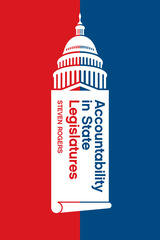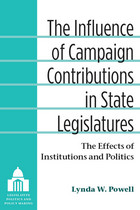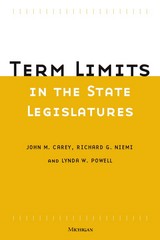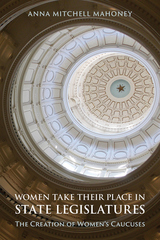
A troubling portrait of democracy in US state legislatures.
State legislatures hold tremendous authority over key facets of our lives, ranging from healthcare to marriage to immigration policy. In theory, elections create incentives for state legislators to produce good policies. But do they?
Drawing on wide-ranging quantitative and qualitative evidence, Steven Rogers offers the most comprehensive assessment of this question to date, testing different potential mechanisms of accountability. His findings are sobering: almost ninety percent of American voters do not know who their state legislator is; over one-third of incumbent legislators run unchallenged in both primary and general elections; and election outcomes have little relationship with legislators’ own behavior.
Rogers’s analysis of state legislatures highlights the costs of our highly nationalized politics, challenging theories of democratic accountability and providing a troubling picture of democracy in the states.

Campaign contributions are widely viewed as a corrupting influence but most scholarly research concludes that they have marginal impact on legislative behavior. Lynda W. Powell shows that contributions have considerable influence in some state legislatures but very little in others. Using a national survey of legislators, she develops an innovative measure of influence and delineates the factors that explain this great variation across the 99 U.S. state legislative chambers.
Powell identifies the personal, institutional, and political factors that determine how much time a legislator devotes to personal fundraising and fundraising for the caucus. She shows that the extent of donors' legislative influence varies in ways corresponding to the same variations in the factors that determine fundraising time. She also confirms a link between fundraising and lobbying with evidence supporting the theory that contributors gain access to legislators based on donations, Powell's findings have important implications for the debate over the role of money in the legislative process.

The term-limit movement--designed to limit the maximum time a legislator can serve in office--swept through the states like wildfire in the first half of the 1990s. By November 2000, state legislators will have been "term limited out" in eleven states.
This book is based on a survey of nearly 3,000 legislators from all fifty states along with intensive interviews with twenty-two legislative leaders in four term-limited states. The data were collected as term limits were just beginning to take effect in order to capture anticipatory effects of the reform, which set in as soon as term limit laws were passed. In order to understand the effects of term limits on the broader electoral arena, the authors also examine data on advancement of legislators between houses of state legislatures and from the state legislatures to Congress.
The results show that there are no systematic differences between term limit and non-term limit states in the composition of the legislature (e.g., professional backgrounds, demographics, ideology). Yet with respect to legislative behavior, term limits decrease the time legislators devote to securing pork and heighten the priority they place on the needs of the state and on the demands of conscience relative to district interests. At the same time, with respect to the legislature as an institution, term limits appear to be redistributing power away from majority party leaders and toward governors and possibly legislative staffers.
This book will be of interest both to political scientists, policymakers, and activists involved in state politics.
John M. Carey is Assistant Professor of Political Science, Washington University in St. Louis. Richard G. Niemi is Professor of Political Science, University of Rochester. Lynda W. Powell is Professor of Political Science, University of Rochester.

How do women strategically make their mark on state legislatures? Anna Mitchell Mahoney’s book traces the development of women’s state legislative caucuses and the influence both gender and party have on women’s ability to organize collectively. She provides a comprehensive analysis of how and why women organize around their gender identity in state legislatures—or why they do not.
Women Take Their Place in State Legislatures includes a quantitative analysis of institutional-level variables and caucus existence in all 50 states. Case studies of caucus attempts in New Jersey, Colorado, Pennsylvania, and Iowa between 2006 and 2010 examine attempts at creating women’s caucuses that succeeded or failed, and why. Mahoney’s interviews with 180 state legislators and their staff explore the motivations of caucus creators and participants. Ultimately, she finds that women’s organizing is contextual; it demonstrates the dynamic nature of gender.
Mahoney also provides insights into broad questions regarding gendered institutions, collective action, and political party governance. Women Take Their Place in State Legislatures fills a lacuna in the evaluation of women in government.
READERS
Browse our collection.
PUBLISHERS
See BiblioVault's publisher services.
STUDENT SERVICES
Files for college accessibility offices.
UChicago Accessibility Resources
home | accessibility | search | about | contact us
BiblioVault ® 2001 - 2024
The University of Chicago Press









